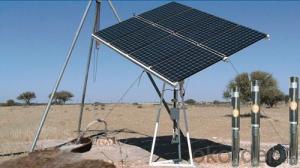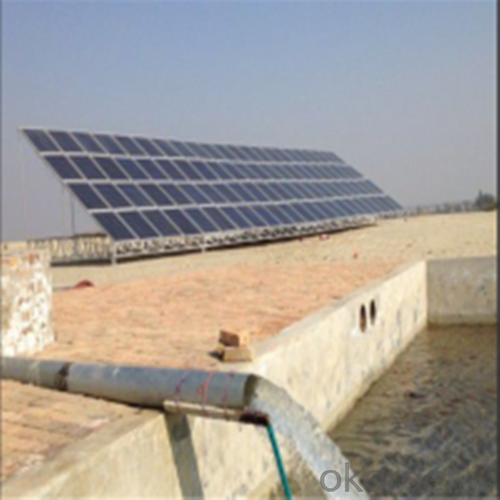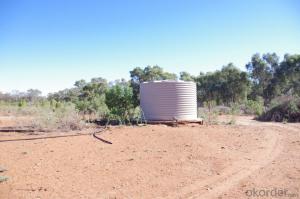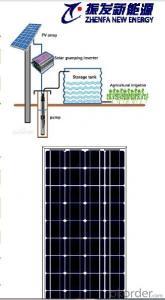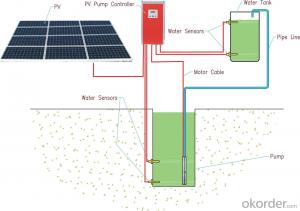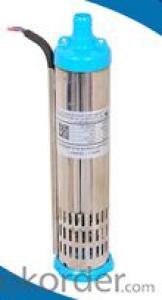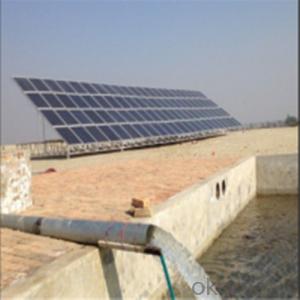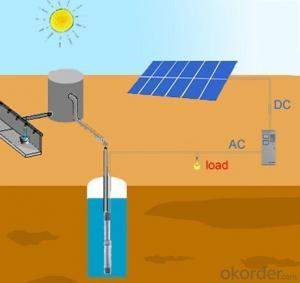Solar Pool Pump - Solar Power Water Pump
- Loading Port:
- Shanghai
- Payment Terms:
- TT OR LC
- Min Order Qty:
- 1 set
- Supply Capability:
- 1000 set/month
OKorder Service Pledge
OKorder Financial Service
You Might Also Like
Solar Pool Pumps Solar Power Pumps Solar Water Pumps
DC solar water pumping system consists of the motor, pump, controller, solar array and some other accessories, such as water level sensor, float switch, etc. Considered that storing water is more efficient than storing electricity, the system is designed to directly drive the pump without battery which can reduce the construction and operating cost and routine maintenance effectively.The PV array consists of multiple solar panels connected in series/parallel, which can supply the whole system as power source by converting the absorbed solar radiation energy to the electrical energy. The pump driven by a brushless DC permanent magnet motor draws water from deep-well or river. The pumped water is then fed into reservoir or water tank, or connected to the irrigation system or fountain system directly.
Advanced Technology
Applications Innovation
The efficiency of DC brushless permanent magnet motor has been increased up to 25% in comparison with traditional asynchronous motor.
Technology Innovation
Stator and rotor are sealed by environment friendly casting resin.Motor insulation resistance can be hold higher than 300MΩfor more than 10 years, which consumedly increased the security and reliability of the submersible motor.
Structure Innovation
Casting resign technology processed stator and rotor as well as the water lubricated bearing make the submersible pump environment friendly.
Feature
High Efficiency & High Reliability
DC Brushless Permanent Magnet Motor
Minimum Maintenance, long Service Life
Environment Friendly Materials, Lubricated Without Oil
Application
Village or Family Water Supply
Animal Drinking Water & Livestock Watering
Garden/Courtyard Irrigation
Swimming Pool
Water Supply for Bivouac or Camping Car
Water Supply for Remote Area
Automatic Control
Operate Automatically, No Need Watching
Maximum Power Point Tracking (MPPT)
Dry-run Protection
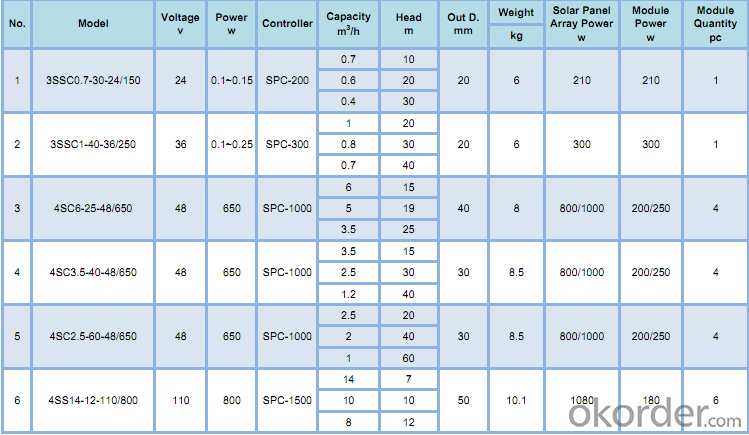
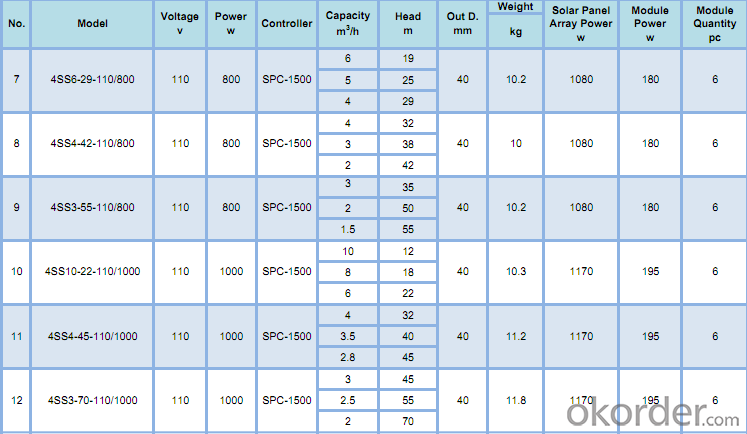
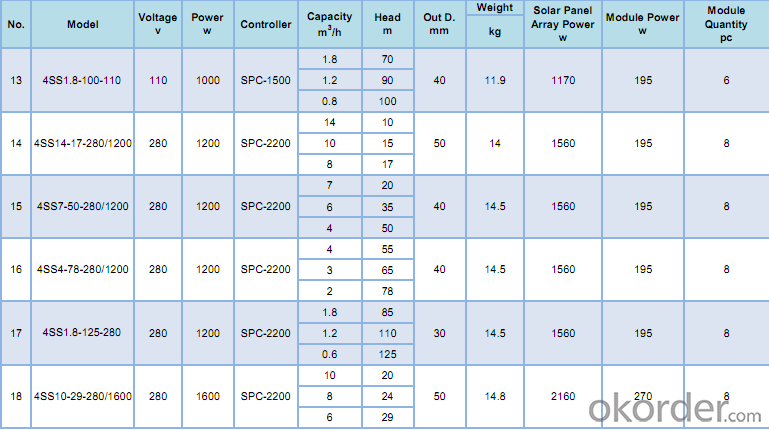
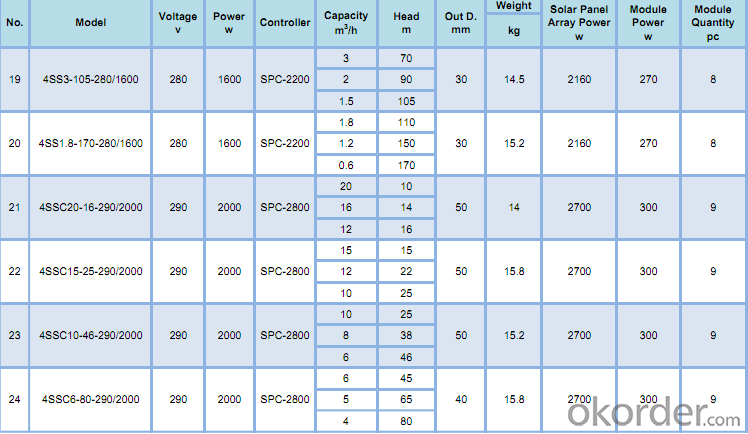
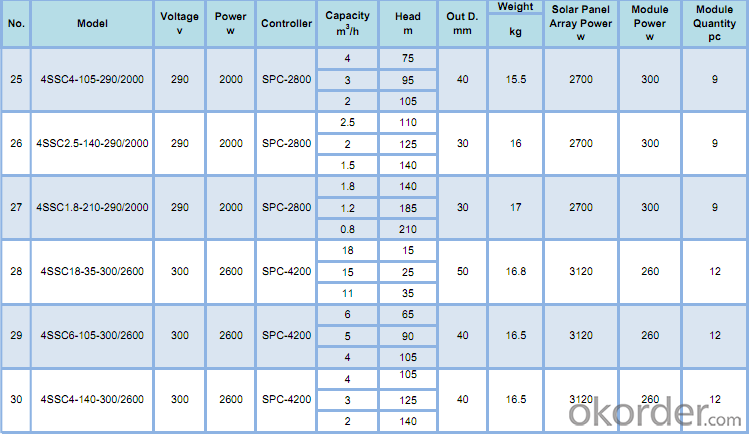
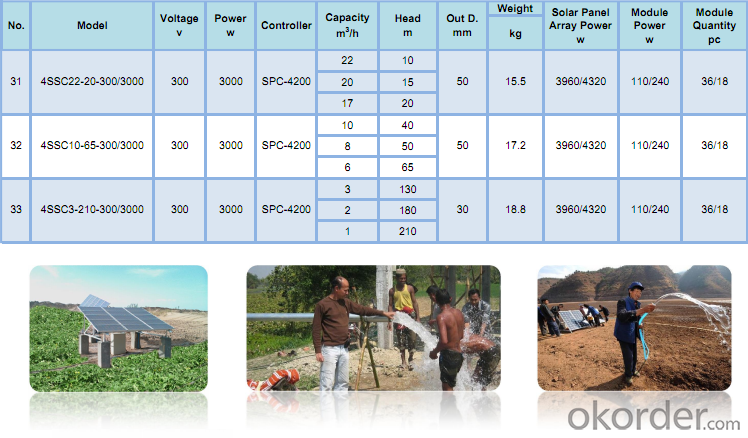
- Q: Can a solar pump be used for swimming pools?
- Yes, a solar pump can be used for swimming pools. Solar pumps are a great environmentally-friendly option for circulating and filtering pool water, as they use energy from the sun to power the pump. They are cost-effective in the long run as they can reduce electricity bills and are low-maintenance. Additionally, solar pumps can be easily integrated into existing pool systems and can help maintain clean and clear pool water.
- Q: Can a solar pump be used for water supply in mining or construction sites?
- Yes, a solar pump can be used for water supply in mining or construction sites. Solar pumps are especially suitable for remote locations where access to electricity is limited. They can effectively extract and transport water from various sources such as wells, rivers, or ponds, providing a reliable and sustainable water supply for mining or construction operations. Additionally, solar pumps are cost-effective, environmentally friendly, and require minimal maintenance, making them a suitable choice for these types of sites.
- Q: Can a solar pump be used in remote areas with no access to electricity?
- Yes, a solar pump can be used in remote areas with no access to electricity. Solar pumps are designed to operate using solar energy, which means they can function independently without the need for a power grid or electricity connection. This makes them an ideal solution for providing water in off-grid or remote locations where electricity is not available.
- Q: Can a solar pump be used in areas with high levels of sediment in the water?
- Yes, a solar pump can be used in areas with high levels of sediment in the water. However, it is important to note that frequent maintenance and cleaning may be required to prevent clogging or damage to the pump. Additionally, using a filtration system or pre-screening the water before it enters the pump can help reduce sediment build-up and ensure the efficient operation of the solar pump.
- Q: How does the depth of the water source affect the performance of a solar pump?
- The depth of the water source can affect the performance of a solar pump in several ways. Firstly, the depth determines the total head or vertical distance that the pump needs to lift the water, which directly affects the power requirements and efficiency of the pump. Deeper water sources may require more powerful pumps to overcome the increased head, resulting in higher energy consumption. Additionally, the depth can impact the pump's flow rate, as the pump needs to work against greater pressure to lift water from greater depths. Therefore, the deeper the water source, the lower the flow rate of the solar pump may be. Lastly, a deeper water source may also affect the installation and maintenance of the pump, as more complex and specialized equipment may be required for installation and repair.
- Q: Can a solar pump be used to pump water from a river or lake?
- Yes, a solar pump can be used to pump water from a river or lake. Solar pumps are designed to utilize solar energy to power the pumping mechanism, allowing for efficient and sustainable water extraction from natural water sources such as rivers and lakes.
- Q: Are there any government incentives or subsidies for installing solar pumps?
- Yes, there are government incentives and subsidies available for installing solar pumps. These incentives aim to promote the use of renewable energy sources and reduce dependence on fossil fuels. Some countries offer tax credits, grants, or low-interest loans to individuals or businesses interested in installing solar pumps. These incentives can help offset the initial costs and make solar pump installations more affordable. It is recommended to check with local government agencies or renewable energy programs to determine the specific incentives available in your region.
- Q: How does the efficiency of a solar pump system vary with different pipe sizes?
- The efficiency of a solar pump system generally varies with different pipe sizes. A larger pipe size tends to result in higher efficiency as it allows for better flow rates and less friction loss. Smaller pipe sizes, on the other hand, can lead to reduced efficiency due to higher pressure drop and increased energy consumption. Therefore, selecting the appropriate pipe size is crucial in optimizing the efficiency of a solar pump system.
- Q: How does a solar pump handle water source contamination from nuclear power plants?
- A solar pump does not directly handle water source contamination from nuclear power plants. However, it can be used as an alternative power source for water treatment systems that are designed to remove contaminants, including those present in water sources affected by nuclear power plant operations.
- Q: Are there any limitations to the flow rate of water a solar pump can handle?
- Yes, there are limitations to the flow rate of water that a solar pump can handle. The flow rate of a solar pump is usually determined by the size and capacity of the pump, as well as the amount of sunlight available to power the pump. The size and capacity of the pump will determine its maximum flow rate. If the pump is too small or has a limited capacity, it may not be able to handle high flow rates of water. In such cases, the pump may struggle to deliver water efficiently or may even fail to pump water at all. Additionally, the amount of sunlight available to power the solar pump can also impact its flow rate. Solar pumps rely on solar panels to convert sunlight into electricity, which is then used to power the pump. If there is insufficient sunlight or if the solar panels are not properly positioned or maintained, the pump may not receive enough power to operate at its maximum flow rate. It is also worth noting that the flow rate of a solar pump may vary depending on the time of day and weather conditions. For example, during cloudy days or in the early morning or late afternoon when the sun is less intense, the flow rate may be reduced. Therefore, while solar pumps are a sustainable and eco-friendly solution for water pumping, they do have limitations in terms of flow rate. It is important to carefully consider the size and capacity of the pump and ensure proper maintenance of the solar panels to optimize the flow rate of water.
Send your message to us
Solar Pool Pump - Solar Power Water Pump
- Loading Port:
- Shanghai
- Payment Terms:
- TT OR LC
- Min Order Qty:
- 1 set
- Supply Capability:
- 1000 set/month
OKorder Service Pledge
OKorder Financial Service
Similar products
Hot products
Hot Searches
Related keywords
